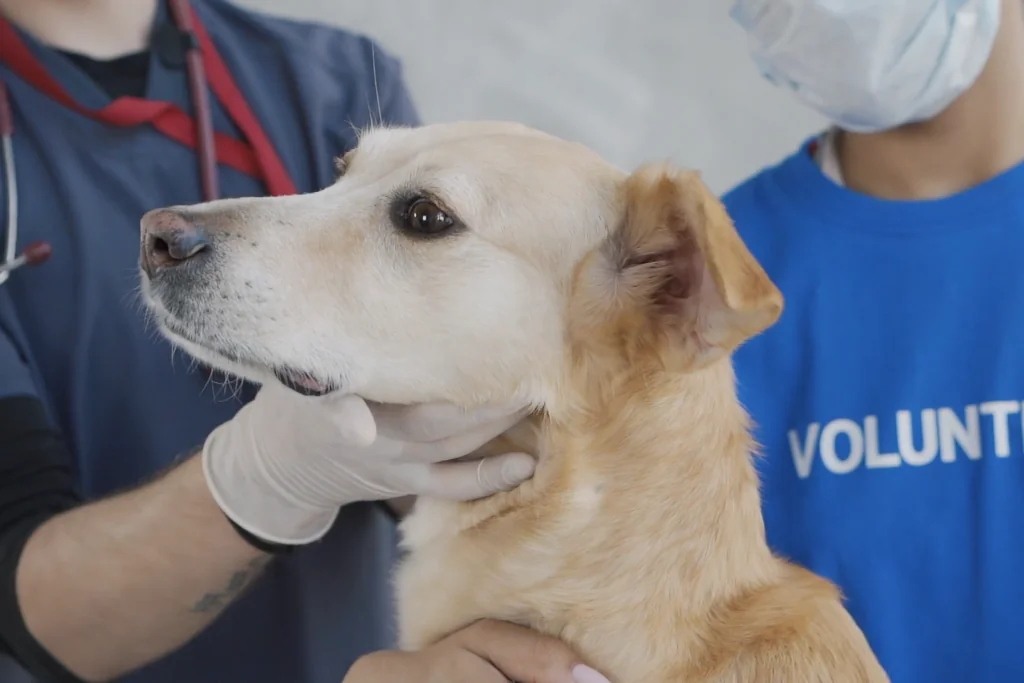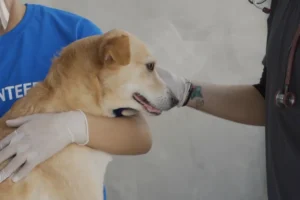Disclosure: We may earn a commission from helpful, relevant links in our content. No cost to you. See our privacy policy.
Nobody wants to think about their beloved pooch potentially harboring parasites. The thought alone is enough to cause a shiver down your spine.
Even worse is the anxiety that comes from not knowing, and constantly worrying about your pet’s health and happiness. That’s where fecal tests and screenings come into the picture.
These procedures aren’t just a one-and-done deal. They’re a continuous effort to ensure your furry friend stays in peak health. The beauty of these tests? They are the detective magnifying glass to your pup’s health – revealing what the eye can’t see.

Why Are Fecal Tests and Screenings Important?
Fecal tests and screenings are like the watchdogs of your dog’s health – always on the lookout.
They play a critical role in early detection of many common and often unnoticed health issues. Parasites, for instance, can be stealthy invaders, often causing damage before symptoms are noticeable.
Regular screenings are your line of defense, often picking up these silent troublemakers well before they wreak havoc.
Moreover, many parasites aren’t just a threat to your dog. They can also pose risks to you and your family. Routine fecal screening helps reduce these risks by identifying and managing these pesky invaders early on.
It’s not just about fighting the bad guys, though. Regular fecal tests are a fantastic way to monitor your dog’s overall digestive health, ensuring their nutrition is on track and their body is absorbing what it needs.
How Are Fecal Tests Performed? (Step-By-Step)
A fecal test is a simple, non-invasive procedure that can reveal a lot about your dog’s health. Here’s a step-by-step breakdown of how it’s typically done:
Step 1: Sample Collection
The first step involves collecting a sample of your dog’s feces. Don’t worry, you don’t have to play detective – your vet will provide you with a special container and instructions on how to do this at home.
The fresher the sample, the better, so it’s best if you can deliver it to your vet within a few hours.
Step 2: Microscopic Examination
Once at the clinic, your vet or a veterinary technician will prepare the sample for microscopic examination. They’ll mix a small amount of the feces with a special solution that helps to separate the eggs and larvae of any parasites present.
Step 3: Centrifuge Process
The sample is then spun in a centrifuge, a machine that spins at high speeds. This helps to separate the solids from the liquids, bringing any eggs or larvae to the top.
Step 4: Examination Under Microscope
The top layer of the solution, which should contain any parasite eggs or larvae, is then examined under a microscope. If there are parasites present, the vet can often identify them based on the shape and size of the eggs or larvae.
Step 5: Results and Next Steps
Once the examination is complete, your vet will inform you of the results and discuss next steps. If parasites are found, treatment options will be discussed to ensure your dog gets back to their happy, healthy self.
What Can a Fecal Screening Detect?
Fecal screenings are like a peek into your dog’s internal world, revealing potential threats lurking within.
They can detect a variety of parasites, including roundworms, hookworms, whipworms, tapeworms, and giardia, to name just a few. These parasites can cause a range of issues from diarrhea to weight loss, and more severe health complications if left untreated.
But it’s not just parasites that fecal screenings can pick up. They also provide valuable information on your dog’s digestive health, giving insights into whether they’re properly absorbing the nutrients they need from their food.
How Often Should Fecal Screenings Be Done?
The American Animal Hospital Association (AAHA) recommends that adult dogs have at least one fecal test per year. Puppies, on the other hand, should have more frequent tests – at least four in their first year of life, as they are particularly susceptible to parasites.
Of course, these are general guidelines, and the right schedule for your dog may vary depending on their lifestyle, health history, and your vet’s recommendations.
Keeping Your Dog Healthy: Post-screening Care
So, you’ve just received your dog’s fecal test results, now what?
Whether the results came back clear or indicated the presence of parasites, it’s essential to continue prioritizing your pup’s health.
One way you can do this is by maintaining a regular deworming schedule as recommended by your vet. This might seem like an extra chore on your plate, but believe me, it can make a huge difference.
Diet is another crucial aspect of post-screening care. Feed your dog a balanced diet rich in necessary nutrients to keep their immune system strong. This doesn’t mean you need to break the bank on fancy dog food, but be mindful of what’s going into your pup’s bowl.
Regular exercise also contributes to overall health, keeping your dog’s heart strong and their mind stimulated. Don’t forget mental exercises too – puzzle toys can be an excellent tool for this.
And of course, keep your vet in the loop. Regular check-ups will help catch any potential health issues early. Always remember, a proactive approach to your dog’s health is the best approach.
FAQs
How often should my dog have a fecal test?
Your adult dog should ideally have a fecal test at least once a year, while puppies should have them more frequently – at least four times in their first year of life.
Can I collect a fecal sample at home for testing?
Absolutely, you can collect a fecal sample at home for testing. Your vet will provide a special container and instructions for doing so.
How soon will I receive the results of my dog’s fecal test?
The timeline for receiving the results of your dog’s fecal test can vary, but typically, you can expect to get them within 1 to 2 days.
What if my dog’s fecal test comes back positive for parasites?
If your dog’s fecal test comes back positive for parasites, don’t panic. Your vet will guide you through the appropriate treatment options to ensure your dog gets back to being their healthy, happy self.
Alex, a passionate animal lover, has experience in training and understanding animal behavior. As a proud pet parent to two dogs and three cats, he founded AnimalReport.net to share insights from animal experts and expand his knowledge of the animal kingdom.




